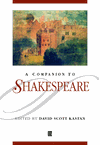Shakespeare's ‘Natiue English’
Summary
In 1578, when Shakespeare was fourteen years old, John Florio, an Italian born and brought up in London, published a textbook for speakers of English who wanted to learn Italian. Called Florio His firfte Fruites (in modern English: Florio's First Fruits'), the book consists mainly of imaginary conversations which are printed in English and Italian for learners to copy. Like most foreign phrase-books, the work has its idiosyncrasies (the subject of buying gloves, and the Vexed question of whether or not they should be perfumed, comes up more frequently than you would expect), but the dialogues offer us a Version of the world in which Shakespeare grew up a Version all the more fascinating since Florio and Shakespeare later shared noble patrons, and almost certainly knew each other (perhaps uncomfortably well: it has been suggested that the Dark Lady of Shakespeare's Sonnets was Florio's wife). Chapter 13 of Florio's book offers its readers examples of Familiare talke' (everyday conversation); in it, several gentlemen chat about the situation in Europe, the realm of England and its queen. Florio's parents were Protestant refugees, so it is no surprise that his speakers praise England ( it is a good Realme') and Elizabeth, the Protestant monarch. She is learned, wyfe, gentle, courteous, noble, prudent, liberal, fayre, louyng, Vertuous … the laft refuge, defenfe, and bulwarke of al banifhed Vertues' (fo.1 1r-V). This kind of hyperbolic idealization of Elizabeth is frequent in English texts of the late 1570s and 1580s: England felt itself isolated and threatened by the Catholic monarchies of Europe, and the fact that the latter tended to have male rulers hardly made the English any less anxious. As if by way of compensation, a cult of Elizabeth, celebrating her and her femininity though significantly her femininity as a Virgin queen developed.



